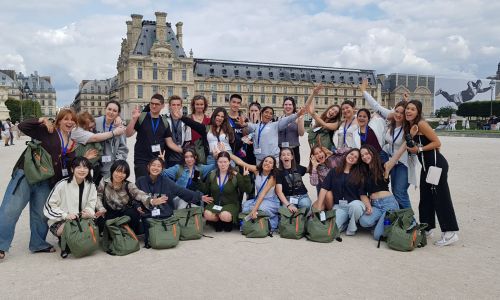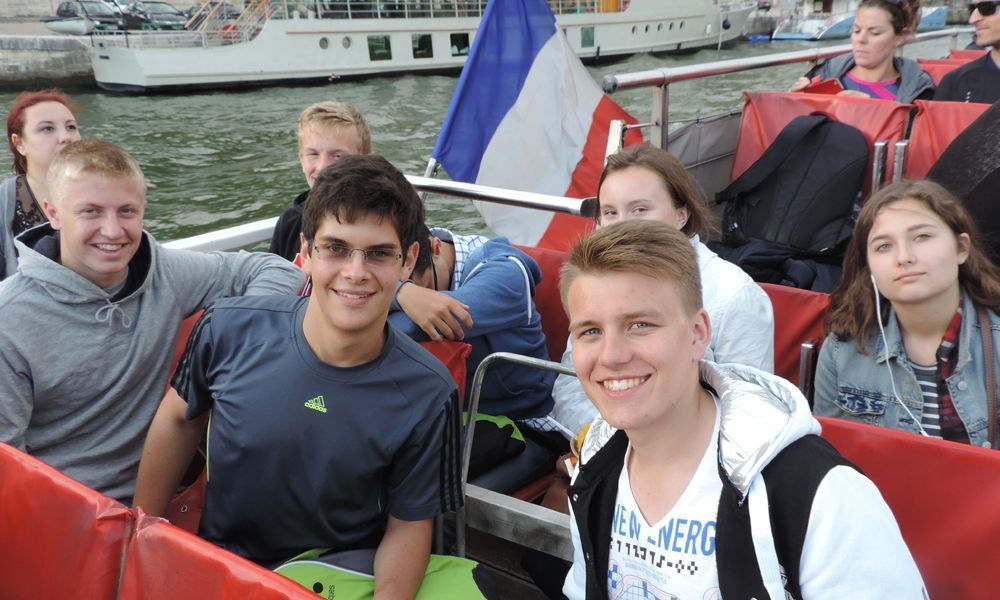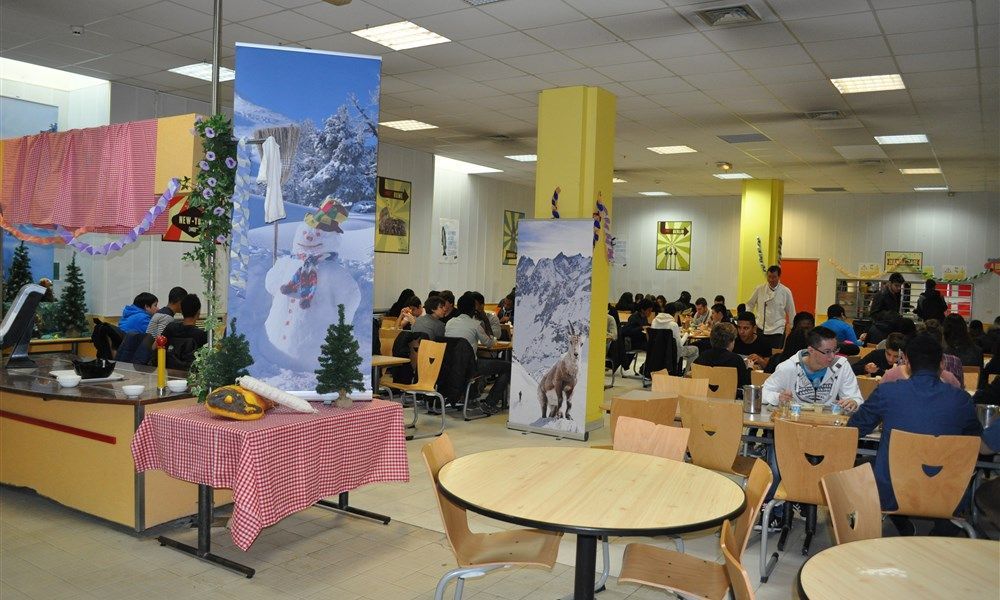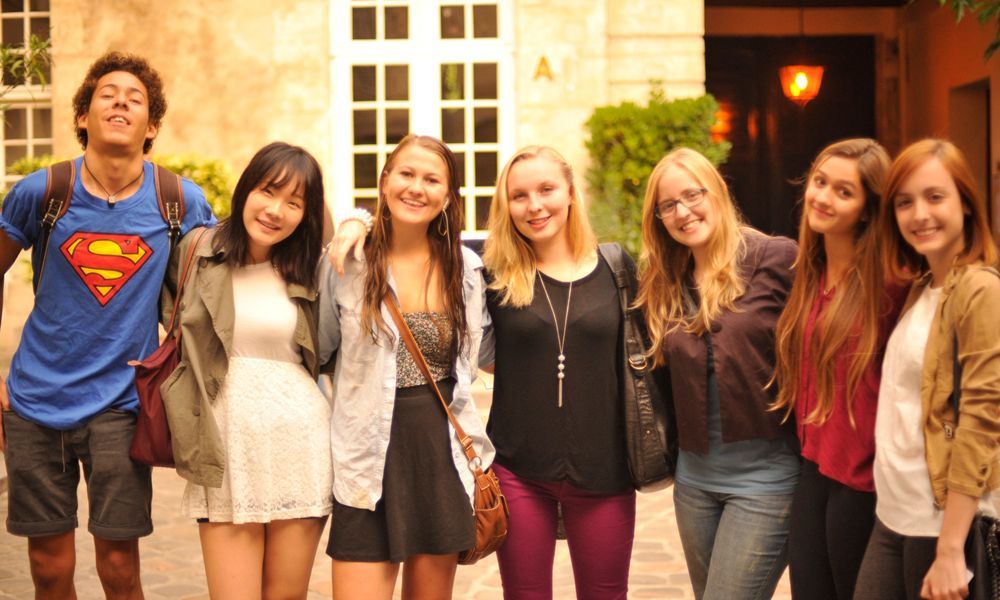High School Abroad
Embark with Nacel on a journey that will change your life.
Challenge yourself and grow up.
Become bilingual and bicultural.
Improve yourself as a person: make the best out of your potential.
Realize a dream.
Embrace the world with Nacel.
Book your school year abroad.
Be a high school exchange student now!
Learn more about our exchange programs for high school students! Look for your school year abroad with Nacel, your high school study abroad organization.
Nacel is a student exchange organization since 1957! We have more than 65 years of experience in organizing High School Abroad programs all over the world. Nacel team helps you make your dream come true and creates the conditions for you to enjoy your study abroad program: we take care of your studies, your accommodation, your arrival, your insurance, and your visa. We follow up on your progress during your school year abroad and support you in case of difficulties.
Thousands of high school exchange students have traveled with us, and many share their school year abroad experience with you. Choose now the best places to study abroad. We have decades of experience in organizing study abroad programs for secondary school students.
Contact our organization to learn more about our exchange programs for high school students, including our summer high school exchange!
Dutch High School Abroad
English High School Abroad
French High School Abroad
German High School Abroad
Italian High School Abroad
Japanese High School Abroad
Korean High School Abroad
- What is Nacel High School Study Abroad Program?
- Who can apply to do a school year abroad?
- Where is the best place for a high school exchange programs abroad?
- High School Study Abroad: choose you country for school year 2025/2026
- High School Study Abroad 2025: choose your language
- High School Term Abroad 2025
- High School Semester Abroad 2025
- High School Year Abroad 2025
- How should I apply to a high school exchange program?
- High School Abroad Programs : Articles and Guides
- Frequently Asked Questions
What is Nacel High School Study Abroad Program?
Can you study abroad in High School? Sure, studying abroad in high school is possible with Nacel. The High School Study Abroad program represents the deepest cultural immersion experience for teens abroad. Those programs foster cross-cultural education for youth and help our teens to become global citizens.
Do you consider studying abroad program during high school? Learn more about the experience of an International Student Exchange.
For students looking for a broader experience of life in a foreign country, Nacel offers study abroad programs for high schoolers for a few weeks, a term, a semester, or a full academic year. High School exchange students on a school year abroad live in a host family or choose a student residence or a boarding school. They attend a public or private high school abroad, allowing them to learn about another culture and improve their language skills. Learn more about Nacel exchange program for your Global Education.
What is the high school abroad experience for?
Nacel Exchange programs for high school students are open to students aged 13 – 18 years old (according to the country) from all over the world. Some restrictions may apply due to visa and foreign residency conditions. Most of our exchange students are :
- high school freshmen,
- sophomores,
- juniors,
- and seniors.
How long does a high school abroad program last?
High School study abroad is possible with a duration of:
- a month,
- a school term abroad,
- a school semester abroad,
- or a school year abroad.
What type of school does an exchange student typically study at?
School-year abroad students attend Public and private Student Exchange Programs.
Foreign exchange students either attend:
- a Day School, living with a host family
- a Boarding school, living part-time or full-time at the Boarding house, and eventually spending weekends with a host family
Where do high school exchange students live in?
During the high school abroad program, accommodation is offered in:
- host families,
- boarding quarters
- or student residences.
When hosted in a family, high school exchange students are placed in a safe and pleasant home. Language learning comes from the immersion at the homestay. The home is carefully selected. Every attempt is made to match family and student where possible in terms of interests.
Who can apply to do a school year abroad?
Participating in a school year abroad means full immersion in the country's life: it is the best way to reach proficiency in the foreign language of the country as well as gain a complete cross-cultural and intercultural experience. The best way to bilingualism!
The Nacel exchange program is selective: every student must be interviewed before being accepted.
Each high school exchange student needs to comply with the following requirements :
- Age specification according to the country,
- 2 or more years of language study with good grades,
- An above-average academic record,
- A previous experience of living away from home,
- An interest in learning about another culture and language,
- A willingness to make new friends and to share the daily life of a host family,
- An open and flexible attitude.
How to become a high school exchange student? Learn more.
Where is the best place for a high school exchange programs abroad?
Nacel Advisors help you determine the "best" place for YOUR high school exchange year: based on your preferences, goals, interests, language skills, objectives, and budget, your Advisor suggests possible destinations. Each student is unique and we pay great attention to your project.
Nacel is an organization that offers exchange programs worldwide to secondary school students. School year abroad is available in 17 countries. Choose your preferred destination for your exchange programs for high school students.
We offer Nacel study abroad programs for high school students for various foreign languages, countries, and lengths!
High School Study Abroad: choose you country for school year 2025/2026
Nacel Educational Travel offers High School Study Abroad in various continents around the world. Study in a high school in Europe, North or Latin America, or even Asia, Africa or Oceania! Find the best study abroad high school programs for you!
High School Study Abroad Europe: learn more here.
Latin America
North America
Asia / Africa / Oceania
High School Study Abroad 2025: choose your language
During your high school exchange abroad, you may learn and improve a variety of foreign languages.
English high school exchange year abroad :
German exchange :
- Germany
French exchange :
- France
Spanish exchange :
Dutch exchange
Russian exchange
- Russian school year abroad in Russia, currently discontinued
Portuguese exchange :
Italian exchange :
- Italy
Japanese exchange :
How should I apply to a high school exchange program?
Contact Nacel, your high school study abroad organization. Providing Student Exchange Service, we will guide you and support you during your whole journey! Attend an exchange student program at the high school level with Nacel.
APPLICATION DEADLINE: Applications for student exchange programs abroad are usually accepted:
- until March for sessions starting in August-September
- and until September for sessions starting in January.
Please check accurate deadlines for each high school exchange year. Late applicants may be accepted, depending on availability and visa delays.
Early application is highly recommended. A student interested in this high school study abroad should contact us immediately and email us the pre-application to secure a place.
Then the student will have to carefully fill out the full application form.
VISA: A High School study abroad program may require students to apply for a student visa, depending on the home country of the applicant, the destination country of his exchange program, and even the duration of the student exchange abroad. We inform and assist our exchange students during their visa application process.
CREDITS/TRANSFERS
The foreign exchange student is not guaranteed:
- placement in a certain grade level,
- or that transferable credits will be granted,
- or that a diploma will be awarded at the end of the High school exchange program.
These decisions remain at the entire discretion of the national educational authorities. Accreditation for courses taken while in the program is the responsibility of the participant. Nacel is not responsible for the procedures needed in this process but may surely assist and advise. For any advice on getting high school credits while studying abroad, contact your Study Abroad High School Program expert.
Are you looking for a bilingual exchange program? Opt for a school year abroad in:
- an American school in Paris: Notre-Dame International High School (French + English)
Discover the Nacel exchange program abroad! Book your school year abroad now. Discover our exchange programs for high school students!
High School Abroad Programs : Articles and Guides
- How do I become a high school exchange student?
- High School Study Abroad in Europe: a world of study opportunities!
- Host family versus Residence: which one should I choose while studying abroad?
- Becoming an Exchange Student in America: A Guide for Applicants from the UK, Ireland, New Zealand, Canada or Australia
- How to write a letter to your future host family as an exchange student?
- How Studying Abroad Helps Students Prepare For Life
- Planning your School Year Abroad: Nacels Checklist - Step 1
- Planning your School Year Abroad: Nacel Checklist Step 2
- Planning your School Year Abroad: Nacel Checklist Step 3
- How about studying in an international school in France? Learn more!
- How can I earn credits from my High School Study Abroad program?
- Crafting the Perfect Introduction Video for Your Future Host Family: a Guide.
Frequently Asked Questions
There are a few tips that will help your child feeling confident and secured abroad. Here are some ideas for him/her:
- Self-learning: try to learn usual expressions you may have to use in your daily life, do thematic wordlists (food, entertainment, clothes…).
- Try to read a book or see a movie in original version, with subtitles in the language too: this is a good training to improve your hearing skills and this will prepare you to your life abroad.
- Collect information about the country or area you will be living in: How is the climate there?
What activities can be done? Are there places to visit? If you are doing a Tour, check the different places you will go to! These tips will leave you with many ideas of outside-of-the-classroom activities and help you to plan your trip so you won’t miss a visit!
We believe that the success of a stay abroad largely depends on the quality of the host family. Our local coordinators carefully select and visit prospective host families.
Our host families are:
- Warm, welcoming & open minded,
- Proud to share their lifestyle & language,
- Willing to include an exchange student in their family & community,
- Aware that today's youth need to be world citizens.
Sometimes student are hosted in an individual room, sometimes in shared rooms. It depends on the destination and program. However, students of different sex won’t share a room.
Generally speaking, there won’t be more than 4 years of difference between two children sharing the same room. In all programs, host families have no duty to organize activities for the student (students must being their own spending money). Students must be mature enough to get occupied by themselves.
Here are some tips for you:
1) Communicate! Please talk about everything and be open with your host family. For example, tell them about your school life, where you are going, and what time you will return. Make a point to discuss host family rules, and schedules (such as when you can take a bath) right away.
2) Ask Questions. When in doubt, ask your host family for help. You might not understand everything at first, but your host family wants to help. You might feel less independent in the beginning, but these feelings will go away eventually. Don’t hesitate, or feel it is impolite to ask many questions. This is normal.
3) Discuss Issues. Sometimes there will be small problems adjusting for you and your host family. It is important to talk about these frustrations even if they seem small. Always talk to your host family first about any problems. If you become sick, tell your host family right away.
4) Allow adjustment time. You may form an image of your host family within the first couple of days that isn’t accurate. Your host family might take you sightseeing, fix special foods, or be extra polite when you first arrive. Little by little, you and your host family will feel more comfortable around each other and act naturally.
5) Participate in Family Life. Don’t hide in your room. If you are feeling homesick, hiding in your room will only make it worse. Have fun with your host family, and share in evening or weekend activities.
6) Keep an Open Mind. Look at differences as new and fun experiences. This is your chance to try many new things that you might not be able to do in your home country. Take advantage of the opportunity!
7) Be polite and friendly. This is important. You might not talk very much with your family in your home country, but if you shut yourself off from your host family they will assume that you are homesick or unhappy. When you like something, be sure you tell them. A “thank you” and a smile can go a long way!
8) Help with Housework and Chores. Seriously, you would be surprised at how much an offer to do the dishes will mean to your host family.
Remember, your host family will also be nervous, especially if it is their first time hosting. They worry about whether you like the food or their family. If you are open and friendly, you will help to put them at ease. At the end of your stay, you will probably find that you do not want to leave!
The benefits of studying abroad are multiple.
Here are some that you may want to consider:
- Develop and improve new language skills.
- Immerse yourself in a new culture and way of living.
- Become more independent.
- Gain a new perspective of your country, the destination country and the world while appreciating diversity.
- Find a family, make new friends and establish international friendships that could last a lifetime.
Nacel International offers twenty destinations around the world. Please select one of the links below corresponding to the country you are interested in.
• High School Abroad Argentina
• High School Abroad Netherlands
• High School Abroad New Zealand
• High School Abroad Russian Federation
• High School Abroad South Africa
• High School Abroad United Kingdom
• High School Abroad United States
Each country has different requirements. In general, these are the most important:
• Age requirement: The student must be between 13 and 18 years old (See the country you are interested in for specific information)
• Language skills: Two or more years of language studies.
• Academic record: An excellent academic record, with good grades.
• Attitude: Having an open mind and flexible attitude are crucial.
• Motivation: Exhibiting willingness to adapt to a new country, culture, school system, and family customs is critical to success.
• Having a spirit of adventure!
Most certainly, you can choose the length that is more favorable to your needs. It could be a term, semester or an academic year.
We also offer short-term homestay and school integration experiences in various countries, starting from just two weeks.
It will depend on each country and school system.
In some countries, the host schools are only allowed to issue a certificate of attendance to their exchange students; in other countries, host schools may issue a grade report which cannot be adapted to your specific needs. It would be a similar report to the ones given to their local students.
You may not be graded in all subjects. The grading scale used is the one of the destination or host country and cannot be adapted to your country’s scale.
The credit system is mainly used in the USA and Canada. In most other countries of the world, you earn a grade report listing your subjects, your grade, and perhaps a teacher comment, but no credits or GPA.
You will need to provide your home school with your grade report, and they will determine which and how many credits they may award you based on your host school’s grade report.
If you attend an international private school, which is typically a boarding school, the school may be accredited by international organizations such as IB World Schools, or by British or American accreditation bodies if they teach British or American curriculums.
Nacel International cannot guarantee credit transfer. We always advise our exchange students to discuss the credit requirements with their home high school prior to applying to the program.
Most certainly! Among the purposes of our programs are acquiring cultural understanding and making new friends. One of the paths to obtain them is via extracurricular activities.
It's possible that your high school may not offer programs related to your interests or hobbies. However, this shouldn't be a problem as your host town will likely have various clubs, community facilities, and sports centers where you can continue to develop your skills and make lasting friendships.
The cost will depend on:
• The country.
• The type of school you’d be attending: public, private, international, boarding school.
• The length of your program.
The price range can be quite diverse, from the most affordable options, starting at 1,500 USD, to the most comprehensive programs, priced at around 35,000 USD.
Once you know the Nacel study abroad program you are interested in, refer to its Price tab section to review what is and is not included. Generally speaking, international airfare, visa and passport fees are not included.
The type of accommodation provided, whether it's a host family, boarding school or a student residence, varies for each program and it may or may not be included in its price. Similarly, transfers from the airport to the program's location or the accommodation may be included or not.
For students under 18 years old (minor children), we highly suggest booking the Unaccompanied Minor (UM) service offered by major carriers to avoid any difficulties during the travel. Parents of underage children will be requested to sign a Parent’s Travel Release.
The Nacel application process for an exchange student program involves several stages to ensure a thorough evaluation of candidates and to match them with suitable host families and high schools.
It's important to note that the specifics of the application process may vary depending on the country involved.
Here's an overview of a typical application process for an study abroad program:
- After you have decided with your family to become an exchange student with Nacel, you start your application.
- The application form collects personal information, academic background, motivations for participating, and preferences.
- You must submit supporting documents such as academic transcripts, recommendation letters, an introduction letter, video, medical records, and any other relevant documents as specified by the program.
- Successful candidates are notified of their acceptance into the program. The local coordinators then work on matching the student with an appropriate host family and high school based on compatibility and availability.
- If a visa is required, Nacel obtains an enrollment letter from the local high school so you can attach it to the rest of the requirements to process your student visa at the consulate of your country of residence.
- Nacel will provide guidance on travel arrangements and itinerary planning.
Absolutely! Participating in a school exchange program abroad will help you stand out with your college and university applications.
Studying abroad can provide you a unique academic experience that sets you apart from others. Besides that, your language skills will improve dramatically, you will learn to be more independent and gain more flexibility, open-mindedness, and intercultural skills that fellow university applicants will not possess.
Colleges, universities and employers highly value exchange programs abroad experiences.
To ensure a smooth and stress-free experience, it is advisable to plan and prepare in advance. We recommend contacting Nacel between September and December if you want to travel the following September. This will give you enough time to gather information, discuss your plans with your parents and high school counselor, and prepare your application form carefully.
If you are ready to work on your application quickly, you may wait until January to March, knowing that you must be on top of documents and communications.
For those planning to start their exchange program abroad in January, it is best to start inquiring in July or August and begin working on your application in September.
You will stay with a local host family who will welcome you as an additional family member. Your host parents and siblings will provide encouragement, support, full board and share their daily life with you.
Your safety is our main concern so, depending upon the country's regulations, every eligible host family is fully vetted by our Local Coordinators. Our screening includes a criminal background check for each member of the household who is 18 and older, as well as in person interviews and visits to the host family’s place of residence.
Our programs revolve around the warmth and comfort of host family accommodation, and we've got over 60 years of experience in making it happen!
Once your placement is confirmed, you can start getting to know your host family right away!
Feel free to use any communication channel that works best for you, whether email, phone calls or video calls.
Host families are not required to organize specific outings, but many enjoy including students in local events, celebrations, or family trips.
Students are expected to be open-minded, flexible, and willing to adapt to the new culture, food, and routines. Maturity and tolerance are key.
They are also expected to help with household chores, respect family rules, and actively engage in family activities to foster meaningful relationships.
There are a few tips that will help your child feel confident and secure abroad. Here are some ideas for him/her:
- Research takes time to research the destination´s culture, geography, and climate. In addition, once you have been assigned a host family, we also suggest communicating with them to get to know them, start building a relationship, and understand their expectations.
- Self-learning: try to learn the usual expressions you may have to use in your daily life, and do thematic wordlists (food, entertainment, clothes…).
- Try to read a book or see a movie in the original version, with subtitles in the language too: this is good training to improve your hearing skills and this will prepare you for your life abroad.
What activities can be done? Are there places to visit? If you are doing a Tour, check the different places you will go to! These tips will leave you with many ideas for outside-of-the-classroom activities and help you to plan your trip so you won’t miss a visit!
Usually, students bring a small gift from their home country to their host family but it is not mandatory at all. It should not be a high-value gift but something typical of your country and culture.
If your child plans on taking electronic devices with him/her, you should check if he/she will need an adapter and buy one if he/she does.
A small, two-entry language dictionary may be very useful (must-have!), as well as a travel book of the city/area, with a plan.
Participant must be aware that they are responsible for the handling of their luggage. We advise you to travel with light luggage.
Aside from essential documents (passport and travel information), school supplies, and a photo album from home, we suggest reviewing the local weather for the time your child will spend abroad so he can adapt his clothes and bring what is necessary.
Take your most important belongings with you on board (hand luggage): necessary drugs if you are sick on board or have medical treatment; acceptance letters, passport, visa papers, and insurance certificate, details of your host family and/or of the person who is supposed to pick you up at arrival, emergency phone number for the program, electronic devices like camera and music devices, jewels if any, glasses, etc.
Students attending a High School exchange program are expected to follow the host family and school rules and attend school daily.
They are not allowed to drive, smoke, drink alcohol, or use drugs during the time he/she participates in the exchange program.
The student will be helped by our local representative and his/her host family to visit a local doctor and get the necessary medical treatment. If hospitalization, surgery, or repatriation is needed, the insurance should be first informed.
If necessary, our team at the headquarters located in France, which delivers a 24-hour emergency service, 365 days a year, may assist you. The phone number of this service will be given to you before the student’s departure.
Please be sure to have a medical insurance. We can provide you with one, for an additional cost. Ask us for more information about the insurance policy!
Your child’s trip abroad will be a rewarding experience, but he/she has to be ready to change his/her way of life for some time and toadapt to the host family.
Here aresome tips to check if your child is ready for this challenge:
- He/She is the one who wants to participate in thestudy abroad program. Never force your child to go abroad if he/she doesn’t want to! At best he/she won’t enjoy his/her trip as much as if he/she would have decided him/herself. At worst he/she will be repelled by his/her language studies back home!
- He/She showsinterest and curiosity about the language or the countryhe/she is going to visit.
- He/She isindependent enoughto be able to cope with problems that may occur (flight delays, loss of luggage, waiting time…), or with homesickness (has he/she already been far away from home? How did he/she cope with that?)
- He/She ismature enough. In some of our programs, supervision is high, and activities are planned all day long. But in others, students are less supervised and must be mature and responsible enough to behave according to the program’s rules and to find occupations.
If you are not sure if your child is ready or not, we can advise you!Meet the teamof Nacel!
Homesickness may happen to everyone, even people who have already been abroad without having faced any problems before. To prevent homesickness, keep in touch with your child, but not too much/too often (see below), and follow our preparation tips. If it is your child’s first experience abroad, a short-term experience would probably be the best choice for you to make, so that your child can “test” himself/herself.
The purpose of most of our programs is the immersion in another country’s language and culture. During the first days, it is normal if your child feels a bit homesick, and too frequent communication with his/her natural parents could delay his/her integration into the host country.
You can suggest she/he get involved in local activities, clubs, and sports to help her/him make friends with similar interests.























